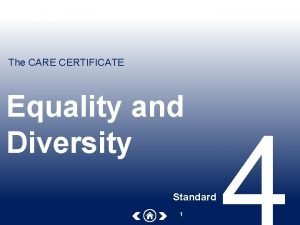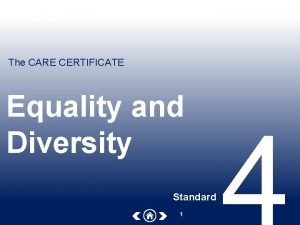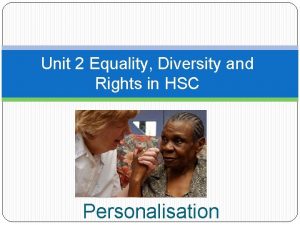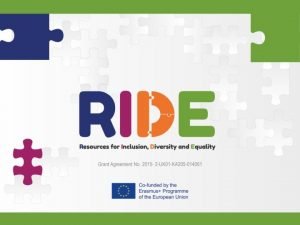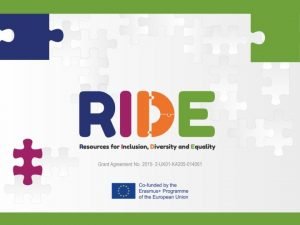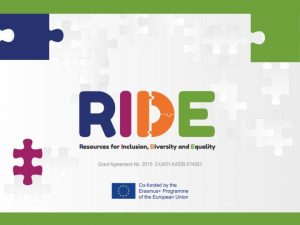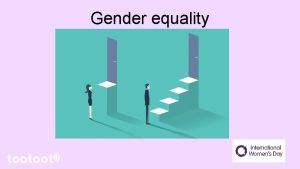The CARE CERTIFICATE Equality and Diversity Standard 1








- Slides: 8

The CARE CERTIFICATE Equality and Diversity Standard 1

Learning outcomes 4. 1 Understand the importance of equality and inclusion 4. 2 Work in an inclusive way 4. 3 Access information, advice and support about diversity, equality and inclusion. Standard 2

Definitions Working in ways that promote Equality, Diversity and Inclusion ensures that care is fair and individuals are not discriminated against Equality Diversity Inclusion Means giving everyone equality of opportunity in line with their needs Can be described as the differences that make people unique Means involving people within a group or within society Discrimination Means to exclude people because of their differences. It involves treating people differently because of assumptions made about a person or group of people based on their differences. 3

Discrimination ■ Direct or deliberate discrimination is done on purpose and is easy to recognise ■ Unintentional or inadvertent discrimination may not be as easy to recognise. Discrimination ■ Activities organised in a place without wheelchair access ■ Meals are only served between 8 am and 5 pm ■ Complaint forms are only produced in English ■ Smaller portions of food are given to women than men Diversity ■ Meals are supplied that meet individuals’ preferences ■ Individuals are given the support they need to take part in activities. 4

Reducing the likelihood of discrimination Ways of working that promote equality, diversity and inclusion reduce the likelihood of discrimination. You should: ■ Provide care that is person centred care ■ Treat the individuals you support as unique ■ Work in non-judgemental ways ■ Follow the agreed ways of working ■ Work in an inclusive way ■ Challenge discriminatory practice. 5

Legislation The Mental Capacity Act 2005 Protects people who do not have the capacity to make their own decisions The Equality Act 2010 ■ Makes it unlawful to treat people unlawfully because of protected characteristics. ■ Protects those associated with individuals with protected characteristics The Human Rights Act 1998 Sets out the basic rights of every human being in the UK Legislation relating to equality, diversity and discrimination The Health and Social Care Act 2012 Aims to give individuals a greater voice in their care 6 The Care Act 2014 ■ Introduces the wellbeing principle ■ Makes care and support clearer and fairer

The code of conduct for Healthcare Support Workers and Adult Social Care Workers includes the following principles: ■ Be accountable ■ Promote and uphold privacy, dignity, rights, health and wellbeing ■ Work in collaboration ■ Communicate in an open, and effective way ■ Respect a person’s right to confidentiality ■ Strive to improve the quality of care and support ■ Uphold and promote equality, diversity and inclusion. 7

Challenging discrimination Discrimination and discriminatory behaviour does not uphold an individual’s rights and must be challenged. It can take courage to recognise and change discriminatory practice Courage Be courageous to challenge or confront situations that you know are not right and that do not promote the wellbeing of all individuals. 8
 Care certificate standard 4
Care certificate standard 4 Care certificate equality and diversity
Care certificate equality and diversity Care certificate answers standard 10
Care certificate answers standard 10 Duty of care certificate
Duty of care certificate Standard 9 care certificate
Standard 9 care certificate Unit 2: equality and diversity in the community
Unit 2: equality and diversity in the community Hse diversity equality and inclusion strategy
Hse diversity equality and inclusion strategy Hse diversity equality and inclusion strategy
Hse diversity equality and inclusion strategy Define equality and diversity
Define equality and diversity
